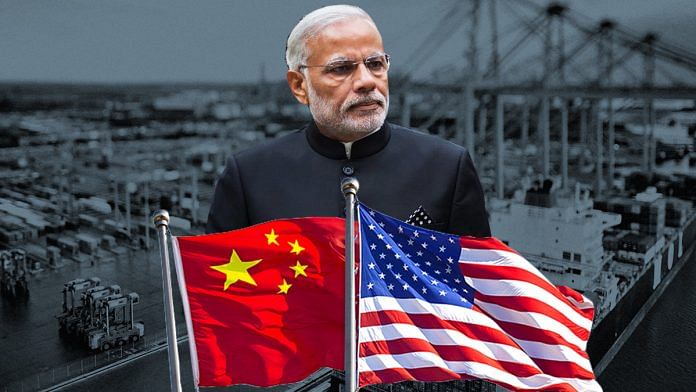The US-China trade war is likely to have an adverse impact on global trade and economic growth. It could once again lead to a rise in global imbalances and inequality. However, India fears that the Trump-Xi clash could also result in China using it as a dumping ground for its goods.
ThePrint asks: In US-China trade war, will India become a dumping ground for Chinese goods or can it benefit?
When 2 giants start fighting, tremors are felt by everyone else & pygmies get crushed
 Ajay Chhibber
Ajay Chhibber
Chief Economic Adviser, FICCI
There is a lot of uncertainty over the extent of the US-China trade war. We have to see if the two giants can strike an agreement. If they manage to do so, the problem that is being anticipated will be arrested. But it will be worrisome if it goes on to become a full-scale trade war because that has the potential to even lead to a situation akin to the Great Depression.
When two giants begin to fight, the tremors are felt by everyone else and pygmies get crushed. Let us understand that India is a pygmy in world trade. In this scenario, a well thought out trade diplomacy will be critical.
Nobody can say how the war will impact India, although, typically in such situations, countries look for their own alliance but we have to be very cautious and keep a close watch on the developments.
In this, we cannot rule out the possibility of dumping of goods by China. China has done this in the past too. This has the potential to dent our domestic manufacturers. We need to be aware, careful and find ways to address this.
China is on the radar for the trade deficit. Now, we must try and encourage the Chinese to come and produce in India. This will address a number of problems simultaneously. It will boost India’s manufacturing sector and create jobs while China, which has seen a rise in wages back home, can benefit too. It is a win-win situation for both neighbours.
That apart, we need to find ways to help our exporters in a manner that it does not lead to another controversy related to subsidies. We need to find ways to boost exports without doling out subsidies. It is imperative to find new markets for our exporters. Besides, we should allow the rupee to depreciate further. The exchange rate remains appreciated by 15 per cent.
Gap left by China and US can be partly filled by Indian exporters
 Ajay Sahai
Ajay Sahai
Director general and CEO, Federation of Indian Export Organisations
The trade war between the US and China seems to be escalating. The US has indicated that every Chinese product imported could be slapped with tariffs. Now this is a cause for worry. China has already created the capacity for the required production of those goods. What will happen to that is the critical question.
In all likelihood, China will continue with the production of the goods. What happens to the goods? Naturally, China would require new and additional markets and it will look for scout for them on an immediate basis. This could lead to dumping in India. We have seen this happening earlier too and currently our trade deficit with China is already high.
Parliament was informed that nearly 214 anti-dumping investigation cases against China have been initiated till December last year. We need to be careful and watchful because this will dent our own markets as prices will be skewed.
I am sure the authorities are aware of this and will come up with required guidelines at the right time.
However, there is hope too for the Indian exporters. This will throw up an opportunity for the Indians. The gap left by China and the US can be partly filled by the country’s exporters.
These are early days and India must try and seize any opportunity that may come its way. This will also provide a long-term solution and address the widening gap between our imports and exports.
Our trade deficit with China in 2017-18 touched $63.12 billion, and was $51 billion the previous year.
Trade war could help India boost its exports sector
Soumya Kanti Ghosh
Chief economic adviser, SBI Group
The trade war between the US and China is erupting at a time when global trade was just starting to pick up. However, let us understand this is not the first time in the history of global trade that such a situation has emerged.
From empirical evidence, we can say that none of the trade wars, which started bilaterally, has the potential to turn into a full-fledged multilateral trade war although a few did go on for longer period of time, in some cases even a decade.
The current trade war is unlikely to have any major impact on India and there is no immediate fear of dumping. India has already put in place several mechanisms to ensure that dumping does not take place. Until now, the Indian stock markets too have not reacted to this situation.
Interestingly, India may stand to benefit.
Currently, India-China trade deficit is rising. But if the US exports to China dip in the near future, India can take advantage of this. If India captures even 1 per cent of the total Chinese imports from the US, we will see an additional 10 per cent increase in India’s exports to China, which will be hugely beneficial to us. Similarly India’s exports to the US could also be enhanced. In all, this could help India boost its exports sector.
Yes, at the same time, we need to be watchful and be ready with Plan B and if the need arises, we should be able to implement it at the earliest. But to conclude that India will be significantly hurt by these two countries’ trade situation is far-fetched.
India must first defuse tensions with US, it can’t fight two-front trade war
 Richard M. Rossow
Richard M. Rossow
Senior advisor and Wadhwani Chair in US-India Policy Studies, Center for Strategic & International Studies
India is already deeply concerned about its trade imbalance with China. Irrespective of the recent US moves to block imports from China, India had its worst trade balance with China in FY 2018 at $63 billion. If this balance of trade starts to worsen, Delhi is likely to take further steps to slow the increase in imports from China. India must choose a targeted approach that does not worsen the already shaky trade ties with the US.
Concerns over Chinese imports triggered some of the counter-measures that have struck a painful nerve in Washington. These steps include local content rules for government procurement, and the finance ministry’s big customs duty increase in the Union Budget 2018-19. Such blanket moves harmed US exporters, leading to a new lot of trade measures against India.
India has a much higher trade surplus with the US than with any other nation – nearly $21.2 billion in FY 2018. Continued escalation of our own mini-trade war, whose roots lie in our trade imbalances with China, could be far more damaging to India’s interests than potential Chinese ‘dumping’ into the market.
India must first defuse trade tensions with the US. It cannot bear to fight a two-front trade war. The origins of our trade fears have a common source, and I hope our leaders can find common ground, perhaps even work together, to urge China to adopt market practices.
India has imposed anti-dumping duty on steel products, but it hasn’t been effective
 Mahua Venkatesh
Mahua Venkatesh
Associate Editor, ThePrint
The immediate fallout of the US-China trade war is the rising uncertainty across the globe. Needless to say, this uncertainty is being felt the most by countries neighbouring the two economic giants.
Although Indian policymakers continue to put up a brave face, the level of nervousness is increasing. Most believe that if the war does intensify, China will naturally scout for newer markets and it will be naïve to rule out any possibility of dumping of goods, especially steel products. More so because China has resorted to dumping its goods in the Indian markets earlier, which has impacted our domestic manufacturers.
Although India has imposed anti-dumping duty on steel products to protect its own producers, the question is whether this is adequate in the current scenario. Many believe that the duty imposition has not been effective and Indian policymakers need to adopt more stringent measures.
Bilateral trade between India and China increased to $89.6 billion in 2017-18, and has been skewed in favour of China. India’s trade deficit with its populous neighbour touched $63 billion, something that has become a cause for concern and the issue has been raised.
While it is still wait-and-watch policy for India and others for now, it is best to firm up a Plan B before things go out of hand. This is even more critical at this stage because the non-performing asset level on account of steel producers was significant. Things have just started looking up with the resolution mechanisms coming to play, and India cannot afford to lose out once again.
Compiled by Mahua Venkatesh, associate editor at ThePrint.



